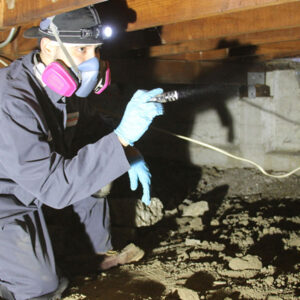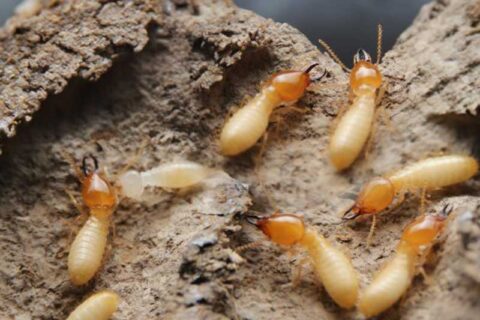4 Major Types of Termite Control by MightyMite Termite
Termites cause significant damage to homes and structures, often going unnoticed until substantial harm has occurred. The key to managing these lies in understanding the available control methods and the details of each approach. In this article we’ll discuss the four primary termite control techniques, providing homeowners with the knowledge to safeguard their properties effectively.

Introduction To Termite Control.
Termite infestations can undermine the structural integrity of a home, leading to costly repairs and significant stress for homeowners. With different types of termites posing various threats, identifying and implementing the most suitable control method is required for effective termite management. From liquid soil treatments that create a chemical barrier to bait systems designed to eliminate entire colonies, the strategies vary in application, effectiveness, and environmental impact. This article aims to equip homeowners with a comprehensive understanding of each method’s pros and cons, helping them to make informed decisions.
Termite Prevention
Preventing termites should be the starting point for any pest control plan. Simple measures such as maintaining an 18 inch gap between the soil and any wooden parts of your home, making sure your gutters and downspouts divert water away from the foundation, and regular inspections for signs of termite activity can significantly reduce the risk of infestation. By creating a less inviting environment for termites, homeowners can often avoid the need for more aggressive treatments.
Major Termite Treatments
Liquid Soil Termite Treatment
Liquid soil treatments involve applying a termiticide around and under the foundation to deter termites from entering the structure. The treatment creates a barrier that termites can’t detect, and they come into contact with the termiticide as they attempt to cross the barrier. The long lasting nature of this method provides peace of mind, but it requires careful application by professionals to avoid potential environmental risks. This method has it’s pros and cons:
Pros– Liquid termite treatment offers powerful protection for many years, making it a wise investment for long term termite management. It’s particularly effective against subterranean termites, the most common type found in many regions.
Cons – The application process can be disrupted and might involve drilling into floors and foundations. The use of chemicals raises concern for environmentally conscious homeowners and those sensitive to pesticide exposure.
Termite Wood Treatments
Treating wood directly with termiticides can prevent termites from causing damage and eliminate active infestations. This method can be applied to exposed wood surfaces, injected into wood, or used during construction to treat lumber before it becomes part of the structure.
Pros – This method offers immediate and targeted protection, ideal for critical areas. During the construction phase, it can be a cost effective solution for localized termite problems.
Cons – The treatment might not reach termites hidden deep within structures or those outside the treated area. Reapplication may be necessary, and access to all vulnerable wood can be challenging.
Fumigation
Fumigation is often the last resort for widespread or difficult to treat infestations, particularly with drywood termites. This method involves enclosing the affected structure and introducing a gas that penetrates all wood areas, eradicating termites throughout the building.
Pros – Fumigation ensures the elimination of termites in hard to reach areas, providing a clean slate for homeowners facing severe infestations. It’s the most thorough treatment available, addressing all infestation levels within the structure.
Cons – The process is disruptive, requiring residents to vacate the property temporarily. It’s also one of the most expensive treatments and doesn’t prevent future infestations, requiring additional preventive measures.
Choosing The Right Termite Treatment Based On Infestation Type
Selecting the most effective termite control method depends on the type of termites present and the extent of the infestation. Homeowners should consult with pest control professionals to identify the termite species and assess the situation before deciding on a treatment plan. A tailored approach, combining the most suitable methods with ongoing preventive strategies offers the best protection against these destructive pests.
Conclusion
Effective termite control involves more than just eliminating existing pests; it requires a proactive strategy to prevent future infestations. By understanding the different termite types and the pros and cons of each control method, homeowners can make informed decisions, so that their homes remain safe and termite-free. A combination of professional advice, preventive measures, and timely intervention is the key to successful termite management.
Consult the Best
Based in the Bay Area, MightyMite Termite Services specializes in addressing termite and pest issues and performing wood repairs for diverse properties. We are recognized for our comprehensive inspections and powerful treatment options, providing innovative termite solutions that eliminate the need to evacuate your home. Our environmentally friendly approach includes using natural substances like orange oil. We prioritize our clients’ needs, offering tailor made treatments guaranteed for two years. Our team, comprised of certified professionals, delivers fast, reliable service, complete with free evaluations and thorough wood repairs after any pest activity. Operating in several Northern California counties we’re your trusted partner in termite and pest management.
For more information about our services, or to schedule a free estimate, contact us via our website or give us a call at 408-377-3761.








